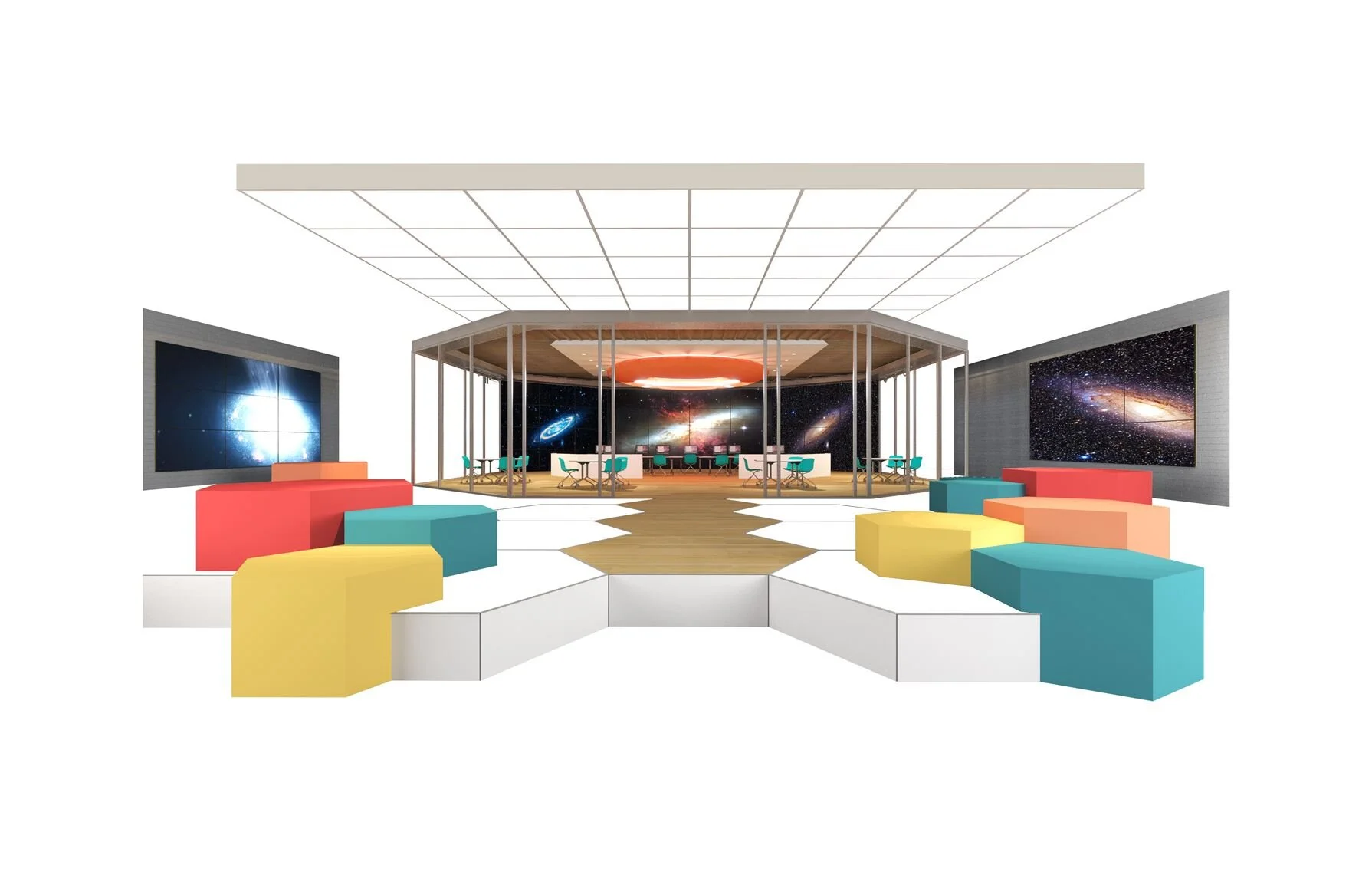“I have a vision of the world as a global village, a world without boundaries.”
Christa McAuliffe
With the knowledge and insight acquired through a quarter-century of dedicated service to the Commonwealth of Massachusetts, the McAuliffe Center is now ready to move forward and embrace a bold, new vision of service for the next 25 years. A service whose scope and reach will have no boundaries.
Central to this vision is the creation of a suite of flexible and adaptive integrated learning environments, conceived as catalysts to learning and collaboration, and ready to serve the diverse population of MetroWest and beyond through innovative experiences that are entirely unique in the region. Reconfigurable physical spaces will allow multiple users to work simultaneously on diverse projects, increasing the Center’s capacity and making it available seven days a week. Most of all, the Center will become home to the invaluable MetroWest ecosystem of people, organizations, and ideas that cultivate our education community through collaboration and innovation, enabling it to keep up with continuously evolving requirements for both local and global workforces, and adapt to the needs of a rapidly-changing society.
An expanded audience base including early childhood education, K-12, FSU undergraduate, graduate and continuing education students, FSU faculty, industry professionals, community groups, and lifelong learners will find a welcoming and inspirational environment that helps to make visitors comfortable with uncertainty, and stimulates innovation. New technology will provide much-needed accessibility support for English language learners, hearing and vision impaired users.
The new McAuliffe Center will give FSU an innovative and entirely unique learning environment that sets the university apart from many competing institutions. Demonstrations of simulation-based learning experiences for prospective students, and the very real opportunity for them to learn and intern in this unique environment, will augment the University’s recruitment and retention efforts. The new Center will leverage the uniquely engaging nature of instructional simulation, inspiring students to apply their own skills, interests, curiosity, and spirit of discovery to the solving of shared problems in a highly collaborative setting. FSU staff will benefit through dynamic professional development programs related to inclusive excellence, accessibility and global education. A technology-enabled distance learning lab will empower FSU students to collaborate with peers, scholars, and industry professionals from around the world, allowing them to extend their academic preparation internationally without requiring them to travel abroad.
The new suite of spaces will continue to facilitate the Center’s most popular programs, including Challenger Learning Center (CLC) mission simulations. A re-imagined CLC simulator will replace the Center’s 25-year-old CLC installation. Students visiting the new McAuliffe Center will enjoy a more dynamic, multi-facetted learning experience, exploring some aspects of a topic in the hands-on environment of the redesigned CLC simulator, others in the immersive learning environment of the FSU Planetarium, and still others within the self-guided environment of an expanded exhibit area. This multi-environment approach to learning will increase engagement and improve overall understanding.
A forward-looking reconceptualization of the McAuliffe Center’s facilities will enable new and as yet unimagined programs, and significantly improve the quality, relevance, and educational impact of existing programs. It will grow FSU’s reputation for innovation by bringing to fruition untapped potential for collaboration among FSU students, faculty, industry, and the community. It will increase the engagement and personal investment of college students, K-12 educators, and college professors alike in the learning process. Finally, it will adapt with the changing needs of visitors and evolving instructional practices, serving as a model facility well into the future.
In his July, 1986 address to the National Education Association, Christa McAuliffe’s husband Steven cautioned members that “If you sit on the sideline, reflect back on Christa as a hero, or as a glorious representative or a canonized saint, rather than putting your energies in accomplishing for her what she wanted to do, then I think her efforts will have been in vain. You will have turned the teacher-in-space program into a feeble substitute for desperately needed help.” Any genuine commitment to Christa’s vision must be a reflection of her own actions, beginning with ideas and facilities that are free of boundaries, unconstrained by convention, and ready to evolve with the changing needs of all learners. The McAuliffe Center chooses to put its energies into this vision, and hopes that you will choose to join us.



